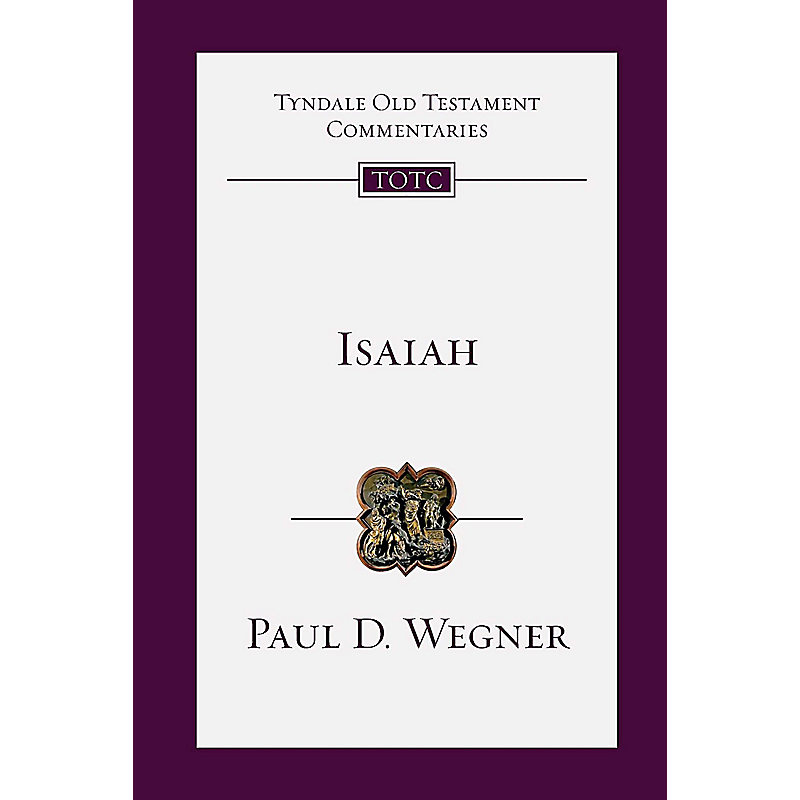
Isaiah: Tyndale Old Testament Commentaries
Paul D. Wegner
Much has been written on the Book of Isaiah. Paul Wegner deepened the reservoir of Isaianic studies with this commentary. It is both approachable and meticulous; it draws readers to engage with the biblical text. After the introduction, Wegner guides readers verse-by-verse through a three-fold format: insights into context, commentary on textual issues and a brief discussion of the meaning of the text. This commentary is a masterful tool for any student of biblical interpretation.
IV. THEOLOGY AND PURPOSE
“The name Isaiah (yešaʿyāhû) means ‘Yahweh is Salvation’ (similar to both Joshua and Jesus), which is one of the key themes of the book. God is repeatedly said to be Israel’s Redeemer (41:14; 43:14; 44:6, 24; 47:4; 48:17; 49:7, 26; 54:5, 8; 59:20; 60:16; 63:16). The primary purpose of the book of Isaiah is to encourage the Israelites to turn away from their wickedness and back toward God, so that they can be a light to other nations. Isaiah calls God the Holy One of Israel twenty-five times, another key theme of the book (fig. 0.11).
In using the word qādôš ‘holy, set apart, separate’ Isaiah underscores how far Israel’s wickedness had removed them from their God. Yet one of the primary messages of the book is that there is hope, because God can do things that no other god can:
‘Come now, let us settle the matter,’ says the LORD. ‘Though your sins are like scarlet, they shall be as white as snow; though they are red as crimson, they shall be like wool.’ (Isa. 1:18)
A. GOD IS WORKING OUT HIS PURPOSE
Isaiah portrays a time when Israel, after a period of purging, will be refined until a holy remnant emerges who not only follows God, but leads others to him as well. Isaiah 2:2 says it best—all nations will stream to it, so that they can learn about this righteous God.
God’s plan to use his people to draw all nations to himself is simple yet almost impossible to believe. It is a recurring theme in each of the sections of Isaiah (e.g., Isa. 1; 2 – 4; 5 – 12; 13 – 39), who repeatedly exhorts the nation to forsake their wickedness and turn to God.
B. GOD WILL JUDGE THE WICKED
The message of judgment for the wicked is likewise clear throughout the book and is highlighted in each of its seams (e.g., 1:28-31; 4:6; 36 – 37; 48:22; 57:21; 66:14b-17, 24). From the outset of his call when the seraphim cried Holy, holy, holy is the LORD Almighty (Isa. 6:1-3), Isaiah was deeply impressed with both his own sin and that of the nation. God announces his intention to bring judgment on the nation for their unwillingness to turn from sin. His righteousness demanded judgment, yet it was also his intention to use this judgment to produce for himself a righteous remnant referred to as the holy seed (Isa. 6:13).
C. ALL NATIONS WILL DESIRE TO KNOW ABOUT YAHWEH (UNIVERSALISTIC APPEAL)
Throughout Isaiah, Yahweh is clearly depicted as Israel’s God and redeemer, but God will also draw a remnant from other nations as well, a message that Israel most likely did not want to hear. In fact, by NT times this message was nearly anathema. Yahweh was the God of Israel, not other nations—let them have their own gods. Yet in one of the most striking passages of Isaiah, God is portrayed as having a personal relationship with people from other nations, all people having been created by him:
24 In that day Israel will be the third, along with Egypt and Assyria, a blessing on the earth.
25 The LORD Almighty will bless them, saying, ‘Blessed be Egypt my people, Assyria my handiwork, and Israel my inheritance.’ (Isa. 19:24-25)
D. A REMNANT
God does not force faith or obedience, so if Israel as a nation chooses to wander away from him, he can still fulfill his promises by working with individuals who do obey him—a remnant (see Shear-yashub ‘a remnant will return,’ Isa. 7:3; 10:21-22). At times in Israel’s history this remnant appears as a lowly hut in a field of melons (Isa. 1:8-9) or a stump in the land (6:13), but they will be the ones to benefit from God’s promises (61:3-7).
E. SERVANT OF THE LORD
In the latter part of the book the servant of the LORD takes on special significance as God’s messenger and the one who will be used to deliver his people.10 In Isaiah 49:3 Israel is called God’s servant but is unable to bring deliverance to the nation, whereas two verses later (49:5) the servant is said to bring Israel back to God. Similarly, the introductions to several other Servant Songs state that God looks among his people but there is no one whom he can use to deliver his people (Isa. 41:27-29; 50:2; 51:18). The concept of the servant of the LORD ultimately goes beyond the ability of Israel, for they would never be able to purge the nation of its sins and live in obedience to God. God therefore had to supply his own ‘suffering servant,’ the Messiah, to give his life to purify the nation and restore them to God (Isa. 52:15; 53:4-12).
Read More

Reflections on the Bible Teaching Conference
Hear from attendees what they learned at the Bible Teaching Conference.

Hope in Suffering
Gateway student Matt Bodden is an evangelist who is ready to answer the question of suffering with the gospel.
Listen
Prophets | Haggai
The boys are back. And by boys we mean the Israelites. The people have returned to their land and after rebuilding their homes and the city walls, God pushed them to finally rebuild His temple. While probably not the most read book in the Bible, Haggai still contains

Prophets | Daniel Part 2
Now with the historical portion of Daniel done, Dr. Wegner takes us through the visions of beasts and years. All these figures intending to show us something. What does it all tell us about God?

Watch

Jonathan Edwards and the Asbury Revival
Chris Chun and Chris Woznicki discuss the signs of true revival, signs of the work of the Holy Spirit, and why it is important to critically assess the characteristics of revival in a spirit of charity.

Jonathan Edwards and the Baptists | Douglas Sweeney, Nathan Finn and Chris Chun
Dr. Douglas Sweeney and Dr. Nathan Finn joined Dr. Chris Chun for a panel discussion on Jonathan Edwards, recorded live at the SBC Annual Meeting in Anaheim.



